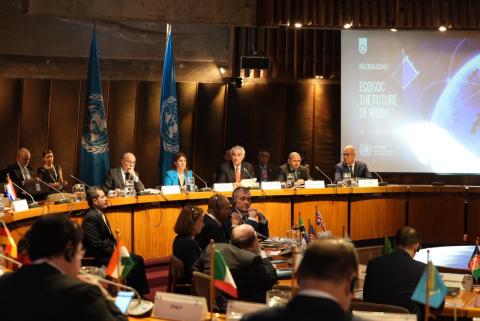Press Release
The Executive Secretary of the Economic Commission for Latin America and the Caribbean (ECLAC), Alicia Bárcena, and the Parliamentary State Secretary of the Federal Ministry for Economic Cooperation and Development (BMZ) of Germany, Norbert Barthle, reaffirmed today in Berlin the strategic cooperation ties between the United Nations regional organization and the German government, with a view to fulfilling the 2030 Agenda in the region.
In the framework of a three-day official visit to Germany, the senior representative of the United Nations also met with Christiane Bögemann-Hagedorn, the BMZ’s Deputy Director General for Latin America, with whom she signed a cooperation agreement for development that gives continuity to the program that both sides have sustained since 1979.
“ECLAC and Germany are strategic allies,” Alicia Bárcena stated during the ceremony at which the agreement was signed.
She added that “ECLAC provides a platform for political dialogue in Latin America and the Caribbean, produces knowledge and recommends public policies to countries on economic, social and environmental issues, while Germany not only supports ECLAC in this work – thanks to its extensive network and experience – but it also takes ECLAC’s knowledge and recommendations and feeds them back into its bilateral projects.”
The 2020-2024 cooperation program will be carried out in two cycles, the first of which will take place between 2020 and 2022, while the second will cover 2022 to 2024. It includes five priority areas grouped in three strategic areas for intervention to achieve a holistic, integrated and cross-sector approach: coherent processes for planning, financing and follow-up; inclusive digital change; and the environmental big push.
The agreement also contemplates a regional program on sustainable management of mining resources in Andean countries.
Subsequently, Alicia Bárcena participated in the workshop “Sustainable and inclusive cities: Opportunities for joint learning between national and municipal governments of Latin America and Europe,” organized by the Federal Ministry for Economic Cooperation and Development and the German Development Institute.
During her visit to the German capital, ECLAC’s Executive Secretary will participate on Tuesday, May 28, in the Latin America Conference, organized by Germany’s Federal Foreign Office.
On Wednesday, May 29, meanwhile, ECLAC’s most senior representative will be part of the Future Affairs conference: “Digital Revolution: Resetting Global Power Politics?”, organized by the German Federal Foreign Office, where she will introduce panel 3 on “Democracy & Digitization: Will Democracy Survive the Digital Revolution?”
Germany has been one of ECLAC’s 46 Member States since 2005. The European nation and the United Nations regional organization have sustained a cooperation program since 1979 that seeks to strengthen the capacity of Latin American governments to formulate, implement and evaluate their public policies on sustainable development.



